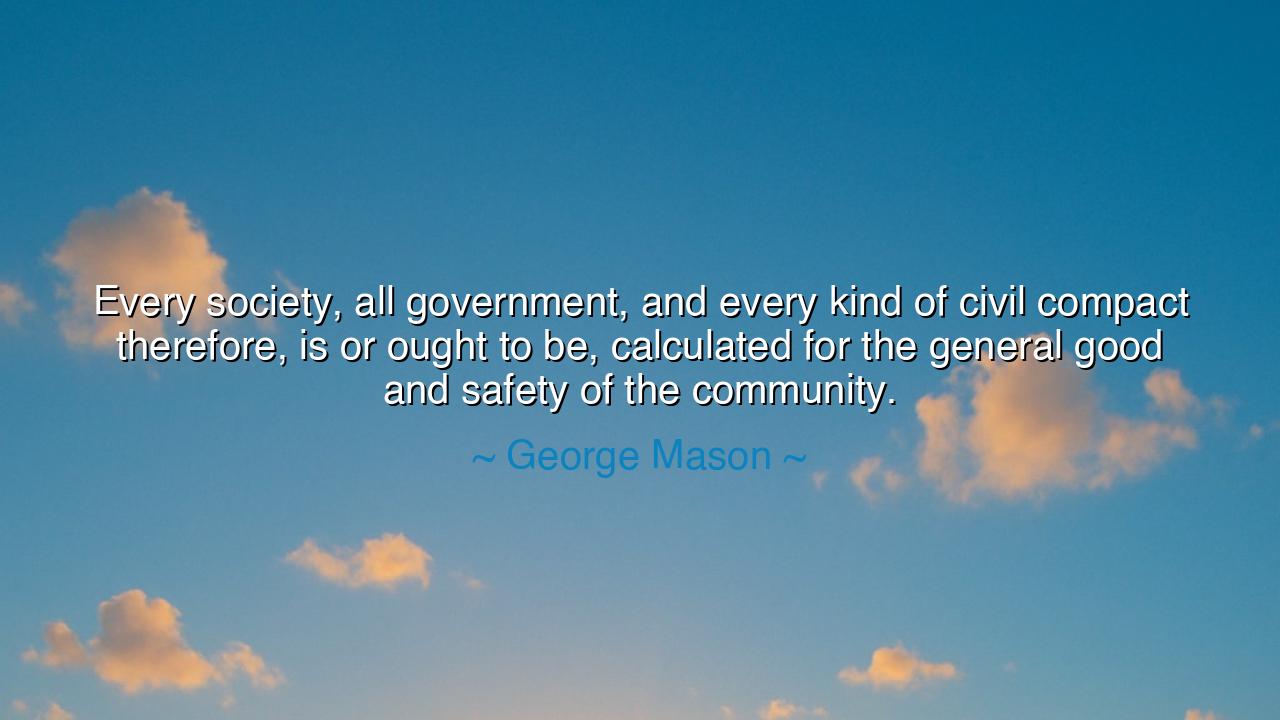
Every society, all government, and every kind of civil compact
Every society, all government, and every kind of civil compact therefore, is or ought to be, calculated for the general good and safety of the community.






The words of George Mason — “Every society, all government, and every kind of civil compact therefore, is or ought to be, calculated for the general good and safety of the community.” — stand like an ancient pillar in the temple of liberty. They are the echo of a truth older than nations, older than law itself: that the purpose of all human order is the good and safety of the people. Mason, one of the great architects of American freedom, spoke not from ambition, but from conscience. He believed that power, unless guided by the light of virtue and the welfare of all, turns swiftly into tyranny. His words remind us that government is not a throne for rulers, but a covenant between equals — a sacred trust designed to guard the common good.
In the fiery dawn of the American Revolution, Mason wrote these words in his Virginia Declaration of Rights of 1776 — a document that would later inspire the Bill of Rights itself. The air was thick with questions that had haunted mankind for ages: What is the purpose of government? Who should hold power, and for what ends? To these, Mason answered with clarity born of moral conviction — that all governments derive their legitimacy only from their service to the general good. Any rule that seeks its own glory or enriches the few at the cost of the many is not governance but usurpation. For society exists not to elevate a handful of men, but to protect the liberty, prosperity, and safety of all.
Mason’s words belong to the lineage of the ancient philosophers. Aristotle, long before him, declared that the just state is one that aims at the “common advantage,” not the interest of the ruling class. Likewise, Cicero spoke of the res publica, the “public thing,” which exists only when bound by justice and shared purpose. Mason, steeped in this wisdom, carried the flame forward into the new world, teaching that no government — however grand, however powerful — can stand if it forgets the people it was meant to serve. His was the voice of moral law speaking through the noise of revolution, reminding mankind that the foundation of liberty is not rebellion alone, but responsibility to one another.
History has proven his insight again and again. When governments turn from the common good, destruction follows. Consider the fall of the French monarchy, whose excesses and indifference to suffering provoked a torrent of blood and fury. When the rulers of France feasted while their people starved, the bonds of society snapped. The Revolution that followed was born not of ambition, but of betrayal — the betrayal of the people’s trust. Mason would have recognized it at once: for when the covenant of care is broken, the governed rise up to reclaim their dignity. The lesson is as true today as it was then — the strength of a nation is measured not by its wealth or armies, but by how faithfully it serves its weakest members.
Yet Mason’s teaching is not only a warning to rulers; it is a call to citizens. For the general good is not maintained by government alone — it depends on the virtue of the people themselves. A free society demands more than freedom; it demands participation, vigilance, and compassion. The law may defend a nation’s body, but only the people’s conscience preserves its soul. When citizens grow selfish, when they seek only private gain and abandon the public good, they invite the very corruption they despise. Mason understood that liberty survives only when citizens see themselves as stewards, not subjects — caretakers of a shared destiny.
This principle shines most brightly in times of trial. Think of the dark days of the American Civil War, when the nation was torn asunder by division and grief. The leaders who rose above the conflict — men like Abraham Lincoln — spoke often of the “common good,” seeking not vengeance, but union and healing. Lincoln’s dream of “a new birth of freedom” was the living embodiment of Mason’s truth: that the purpose of government is not to serve faction or vengeance, but to preserve the life and liberty of the whole. Even amidst fire and blood, the highest duty of a nation is to restore the bonds of community, to remember that all its people are one.
So let this be the lesson for every generation: government is a servant, not a master, and its worth is measured only by how it uplifts the people. The laws of a nation must always look outward, toward the welfare of all, not inward toward privilege or ambition. Each citizen must guard against apathy, for neglect is the seed of tyranny. Let every man and woman ask not only what their government owes them, but what they owe to the common good — for that is the true measure of liberty.
And thus, as the ancients taught and Mason reaffirmed, the safety of the community is the law of all laws. When leaders govern for the people, when citizens act with conscience, and when justice binds both together, the nation stands unshakable. But when selfishness triumphs and the general good is forgotten, the pillars crack, and the house of freedom begins to fall. Therefore, remember always this sacred truth: the highest purpose of every society is not power, nor profit, but the enduring good and safety of all who dwell within it.






AAdministratorAdministrator
Welcome, honored guests. Please leave a comment, we will respond soon